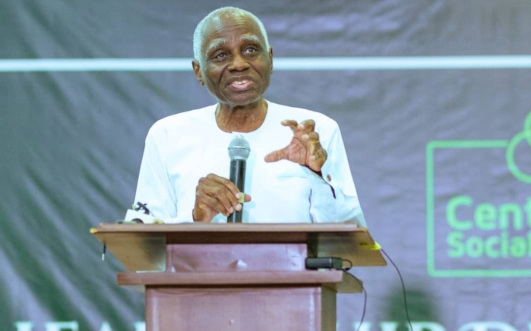We can gain from brain drain –Tsikata
Tsatsu Tsikata, a respected lawyer and scholar, has argued that the brain drain of Ghanaians seeking better opportunities abroad is not entirely negative, as it presents significant economic advantages that could be utilized for national progress. He emphasized the valuable contributions of Ghana’s diaspora community in terms of foreign exchange inflows and overall economic potential.
Speaking at the 14th Leadership Dialogue organized by the Centre for Social Justice (CSJ), Tsikata suggested that instead of focusing on the downsides of mass emigration such as talent loss, Ghana should recognize the positive aspects. While many organizations express concern about the brain drain and call for solutions, Tsikata believes that solely focusing on the losses is not productive.
Rather than dwelling on the issue, Tsikata sees an opportunity in the situation. He highlights the economic value of the relationship between Ghanaians in the diaspora and the country, particularly in terms of remittances. He points out that these financial contributions often exceed revenue from natural resource exports, and proposes that these funds could be utilized more effectively to support Ghana’s economic development.
Tsikata encouraged a shift in mindset to view the diaspora as a strategic asset for Ghana’s economic growth, emphasizing the potential for harnessing their contributions from afar. Instead of lamenting their departure, he believes it is essential to capitalize on the economic benefits they can bring to the country.
Tsatsu Tsikata proposes solution to Ghana’s cedi depreciation
Ghanaian legal luminary Tsatsu Tsikata has proposed a solution to Ghana’s recurring Cedi depreciation.
Speaking at the 14th Leadership Dialogue organised by the Centre for Social Justice (CSJ), Mr Tsikata’s proposal focused on an approach he terms the “foreign exchange footprint” of individuals, aimed at bolstering the nation’s economy and mitigating the impacts of Ghana cedi’s devaluation.
The former Chief Executive of the Ghana National Petroleum Corporation (GNPC) began his presentation by addressing pressing issues faced by Ghana, including brain drain and the persistent depreciation of the cedi.
He noted that while many young professionals are leaving Ghana for opportunities abroad, this situation also presents a chance to leverage the economic potential of the Ghanaian diaspora.
“The diaspora and indeed Africans beyond Ghana have a unique relationship with the country that can be economically beneficial,” Tsikata explained on Wednesday, August 28, 2024.
Mr Tsikata made the proposal when he delivered the keynote address at the 14th Leadership Dialogue organized by CSJ, a think tank, with support from Friedrich-Ebert-Stiftung (FES-Ghana) and Woezor TV.
The Leadership Dialogue Series is the flagship civic education platform of CSJ, a left-of-centre think tank. For years, the Leadership Dialogue has sought to nurture mass political participation and patriotic values through stimulating discussions with experts and prominent national leaders.
On the issue of dealing with Ghana’s depreciating cedi, Tsikata further noted that remittances in foreign exchange from Ghanaians abroad often surpass the revenue from mineral exports, underscoring the financial significance of this global connection.
Forex Footprint
The crux of Tsikata’s proposal lies in redefining how Ghanaians approach their consumption of foreign goods.
He introduced the concept of a “foreign exchange footprint,” drawing a parallel with the contemporary practice of assessing one’s carbon footprint.
“We need to examine our individual foreign exchange footprint. By evaluating how much we depend on foreign products and identifying areas where we can switch to local alternatives, we can reduce our dependence on imported goods and strengthen local production,” he explained.
Ghana’s perennial forex challenge
According to a paper by the International Institute for the Advanced Study of Cultures, Institutions, and Economic Enterprise, on an annual basis, there has not been a single year when the cedi has not lost value since the country moved from the fixed exchange rate regime to the current floating exchange rate system as part of the economic reform program embarked on in April 1983.
Over the past few decades, the cedi has lost about 99.9841% of its value against the US dollar.
The least rate of annual depreciation of 0.9 per cent occurred in 2005 while the year 2000 saw the highest cedi depreciation of 49.8 per cent since 1984.
On average, the cedi has depreciated annually by a rate of 20.3 per cent in three decades. $1 currently sells for close to 16 Ghana cedis (GH₵15.65) as of August 30, 2024.
The depreciation of the cedi exacerbates inflationary pressures and erodes business capital, thereby worsening the overall economic situation of the country.
A Novel Approach
Tsikata’s approach makes a case for a comprehensive review of personal and collective consumption patterns to identify which foreign products can be replaced with locally produced alternatives.
His strategy aims to reduce Ghana’s import dependency, thus alleviating the pressures that contribute to the cedi’s depreciation.
“The goal is to drive local production and create a self-sustaining economy that relies less on external factors,” Tsikata added.
The proposed solution highlights the need for systemic changes in how Ghanaians interact with the global economy, suggesting that individual actions can collectively impact national economic health.
Tsikata’s call is a shift towards a more introspective and proactive approach to managing Ghana’s economic challenges.
He urged economists and experts to consider his proposal and improve it if necessary.
Ghana needs a great leader
Tsikata also addressed the broader context of Ghana’s economic challenges, calling for leadership that is honest, humble, and capable of leveraging the nation’s resources effectively.
He urged leaders who are committed to tackling economic issues with transparency and a willingness to seek external expertise when necessary.
Read more here:
Exchange-Rate-IIAS-Paper__.-Edited






















































